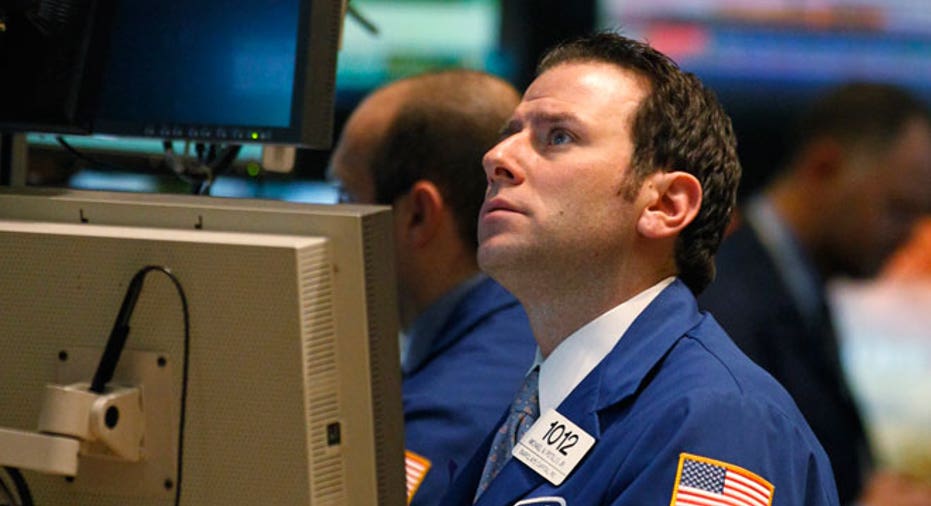Stock Futures Slide Amid Renewed Euro Fears

FOX Business: The Power to Prosper
Wall Street was off to a rocky start on Monday, with stock futures pointing to steep losses, following the longest winning streak in months as concerns over Europe's sovereign debt crisis flared up once again.
Today's Markets
As of 9:05 a.m. ET, Dow Jones Industrial Average futures slid 177 points to 11,269, S&P 500 futures dipped 22 points to 1,190 and Nasdaq 100 futures tumbled 38.3 points to 2,269.
The markets posted a five-day rally last week, with the blue chips soaring 517 points, or 4.7%, pushing the Dow to the highest point since late-August. However, sentiment quickly took a turn for the worse on Monday as the euro zone crisis once again took center-stage.
The European Union and International Monetary Fund told Greece it must enact deeper austerity measures, and cut its deficit further, to qualify for roughly $11 billion in aid due next, which is part of a larger bailout package. The Mediterranean country has been struggling to pay its debts, and will likely default if it doesn't receive this aid tranche. Concerns over Greece, and its potential spillover to larger economies like Italy, have pressured markets for months.
There have also been broader worries over the unity of the 17-member currency bloc, which have also come to focus after German Chancellor Angela Merkel's party was defeated in a state election. There has been political strife in Germany, Europe's biggest economy, over aid it has given to struggling countries, like Greece, and this is yet another upset, market participants say.
European banks, which are likely to be the most directly affected by a sovereign default, were pummeled in trading there. In particular, English financials like Barclays and Lloyds were down particularly sharply.
As a result of fresh instability in equities, traders have once again raced to the perceived safety of U.S. debt. The yield on the benchmark 10-year Treasury note slumped to 1.997% from 2.051%. Gold was modestly higher, climbing 40 cents, or 0.03%, to $1,815 a troy ounce.
The euro fell 0.18% against the U.S. dollar, while the greenback gained 0.73% against a basket of world currencies.
On the U.S. front, market participants will also be focusing on President Barack Obama's plan to trim the federal budget deficit by some $3 trillion over the next 10 years. The plan is expected to include a higher tax on wealthy Americans and revisions to entitlement federal programs, such as Medicare and Medicaid.
The only major economic release on tap for Monday is the Housing Market Index, which is expected to hold steady in September. The index measures homebuilder sentiment, that has been hit hard by slowness in that industry. Homebuilders such as Toll Brothers (NYSE:TOL) and KB Home (NYSE:KBH) may be particularly affected by these data.
Market participants are closely eyeing the Federal Reserve's two-day meeting slated to begin on Tuesday. The central bank is widely expected to take some additional measures to fight growing economic headwinds that policymakers increasingly see as structural, as opposed to temporary.
Energy markets were broadly lower. Light, sweet crude slid $1.02, or 1.2%, to $86.94 a barrel. Wholesale RBOB gasoline slipped a penny, or 0.46%, to $2.77 a gallon.
Corporate News
UBS (NYSE:UBS) widened the estimated loss from the rogue trade unveiled last week to $2.3 billion from $2 billion, and also started an internal investigation that will be run by David Sidwell, a former chief financial officer at Morgan Stanley (NYSE:MS).
Netflix (NASDAQ:NFLX) is breaking up its streaming and DVD-by-mail service. The streaming service will continue to be called Netflix, and the rental service will be branded Qwikster. The move comes after the company boosted the price of its services, upsetting many customers.
Tyco International (NYSE:TYC) is splitting into three separate, publicly traded entities, a process that should be completed over the next 12 months.
Foreign Markets
The English FTSE 100 tumbled 1.7% to 5,257 and the German DAX plummeted 2.6% to 5,428.
In Asia, the Japanese Nikkei 225 jumped 2.3% to 8,864 and the Chinese Hang Seng plunged 2.8% to 18,918.



















